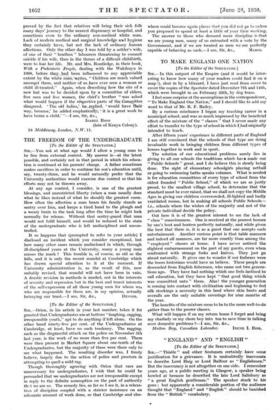TO MAKE ENGLAND ONE NATION
[To the Editor of the SPECTATOR.] Sut,—In this outpost of the Empire (and it would be inter- esting to know how many of your readers could find it on a' map !), shut in by a blizzard, I have just read from cover to cover the copies of the Spectator dated December 7th and 14th, which were brought in on February 25th, by dog team.
I feel some surprise at the assumptions in the correspondence, "To Make England One Nation," and I should like to add my word to that of Mr. R. F. Bailey.
By a curious mischance I began my teaching career in a municipal school, and was so much impressed by the beneficial effect of the mixture of the " classes" that I never made any effort to transfer to the type of school in which Iliad originally intended to teach.
After fifteen years' experience in different parts of England I am still convinced that the schools of that type are doing invaluable work in bringing children from different types of homes together in work and in sport.
The solution of our educational problems surely lies in giving to all our schools the traditions which hal e made our. "Public Schools" great, and I do believe this is slowly being done. The sight of elementary schoolgirLs playing netball or going to swimming baths speaks volumes. What is needed is for education committees of every type of school from the oldest founded "Public School," of which we are so justly proud, to the smallest village school, to determine that the standard must be ever raised, that we shall not copy the Middle Ages in giving our children overcrowded, ill-lighted and badly ventilated rooms, but in making all schools Public Schools- i.e., schools where the wishes of the majority and not of the private individual decide the policy.
Out here it is of the greatest interest to see the lack of " class " consciousness. One is received at the poorest houses by one's host and hostess perfectly naturally, and while given the best that there is, it is as a guest that one accepts such entertainment. Another curious point is that table manners and indeed all manners, are far more courtly than among the " employed " classes at home. I have never noticed the slightest embarrassment on the part of my guests, even when confronted with strange forks and knives. They just go ahead naturally. It gives one to wonder if our forbears were the boors historians would have us believe. These people are descended from English fishermen, who came out two genera- tions ago. They have had nothing which one feels inclined to call education, but they have kept "that good thing which was committed unto" them. Alas ! the younger generation is coming into contact with civilization and beginning to feel silk stockings a necessity in this land where skin boots and overalls are the only suitable coverings for nine months of the year.
The benefits of the mixture seem to be to the more well-to-do rather than to the poorer classes.
What will happen if on my return home I forget and bring my charlady or my chore boy into tea to save time in talking over domestic problems ?—I am, Sir, &c., Mutton Bay, Canadian Labrador. IRENE I. Bras.


















































 Previous page
Previous page